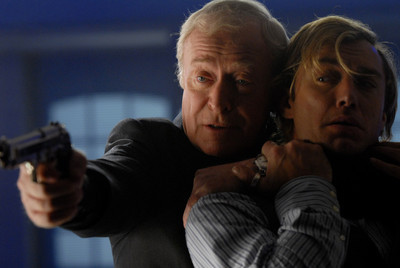‘Sleuth’
Witty, diabolical fun.
That's what the 1972 movie version of "Sleuth," based on Anthony Shaffer's 1970 stage hit, delivered.
The new "Sleuth" goes double on the diabolical wit. With Nobel laureate Harold Pinter reshaping the script to fit his chilly minimalist aesthetic, it could hardly be otherwise.
But fun? Not so much.
For those who know the original "Sleuth's" secrets, there's some intellectual intrigue in keeping score as the new version unfolds -- and reveals how little of the original survives.
It's also fascinating to watch Michael Caine -- who earned an Academy Award nomination for his performance in the first "Sleuth" -- take on the role originally played by fellow Oscar nominee Laurence Olivier.
Extending the coincidences, the actor who assumes Caine's original role, Jude Law, also played the title role in the 2004 remake of "Alfie," for which Caine earned his first Oscar nomination, way back in 1966.
Keeping track of those twists, however, is nothing compared to the serpentine shifts "Sleuth" throws at audiences.
All those turnabouts and tricks should be part of the fun. But, as noted previously, this "Sleuth" isn't about fun, diabolical or otherwise.
Its players take the games they play far too seriously for that.
The playing field: the stately British home of fantastically successful crime novelist Andrew Wyke (Caine).
On the outside, the palatial residence resembles its historic neighbors.
On the inside, however, its stark contemporary decor -- and its array of high-tech devices -- betray Andrew's mania for control.
Apparently, however, there's something (or, more precisely, someone) beyond Andrew's control: his much younger wife, who appears to be having an affair with unemployed actor Milo Tindle (Law, who also serves as one of the producers).
Of course, it would be too, too uncivilized of Andrew to allow his jealousy to consume him outright.
Instead, Andrew offers Milo an offer he probably ought to refuse: a divorce from his wife, assuming Milo agrees to play burglar in a make-believe jewelry theft.
That way, Milo and the soon-to-be-ex-Mrs. Wyke get the jewels, Andrew will get the money they're insured for -- and no one will be the wiser.
Except, of course, for Andrew and Milo, who have other, deadlier games to play.
On the surface, "Sleuth's" claustrophobic setting and cat-and-mouse narrative seem a perfect fit for Pinter, whose plays often trap two characters onstage -- and leave them there until they can't help going for each other's throats.
In making "Sleuth" his own, Pinter has made overt (and obvious) what seemed implicit the first time around, from the sexual tension between two characters battling over the same woman to the inherent social conflict between a to-the-manor-born true Brit and a rival from a much lower social stratum.
And director Kenneth Branagh (once considered the second coming of Olivier himself for, among other things, bringing Shakespeare to the screen) embraces Pinter's changes wholeheartedly.
That includes a crucial switch in the look of the movie, transforming Andrew's abode from a sinister carnival fun house into a steel-and-glass ice palace stocked with more high-tech toys than an electronics superstore.
As such, it's equipped to provide plenty of visual dazzle, from doors that aren't really doors to staircases leading nowhere. As Branagh's camera explores every angle, however, the stark settings heighten, rather than counteract, "Sleuth's" staginess.
So, ultimately, do the performances.
But, in a movie as relatively bloodless as "Sleuth," that's probably a good thing. Caine revels in the chance to slowly reveal the raging avenger buried beneath an oh-so-sophisticated façade, while Law adds a layer of reckless ferocity to his familiar role of devilish rascal.
The two of them seem perfectly at home within "Sleuth's" puzzle-box plot, scheming and snarling and struggling to maintain the upper hand.
They may even be having fun. But, as this "Sleuth" proves too often for its own good, the audience doesn't always share in the fun.
Contact movie critic Carol Cling at ccling@reviewjounal.com or (702) 383-0272.
CAROL CLINGMORE COLUMNS
movie: "Sleuth" running time: 86 minutes rating: R; profanity, violence verdict: C+ now playing: Suncoast DEJA VIEW Things are seldom what they seem in these twisty mysteries: "Witness for the Prosecution" (1957) -- Billy Wilder directs Agatha Christie's thriller about the witness (Marlene Dietrich) whose testimony holds the key to the fate of a murder suspect (Tyrone Power). "Sleuth" (1972) -- Oscar nominees Laurence Olivier and Michael Caine play rivals engaged in a deadly duel of wits in the first version of Anthony Shaffer's stage hit. "Deathtrap" (1982) -- "Sleuth" star Caine plays a playwright plotting to steal a script written by a student (Christopher Reeve) in a turn-the-tables comic thriller based on Ira Levin's Broadway hit. "The Usual Suspects" (1995) -- Who is Keyser Soze? That's only one of the questions in this thriller about a heist gone wrong featuring Oscar-winner Kevin Spacey, Gabriel Byrne, Stephen Baldwin, Kevin Pollak and Benicio Del Toro. "The Illusionist" (2006) -- In turn-of-the-20th-century Vienna, a master magician (Edward Norton) matches wits with a police inspector (Paul Giamatti) in the employ of a jealous prince (Rufus Sewell). -- By CAROL CLING






















